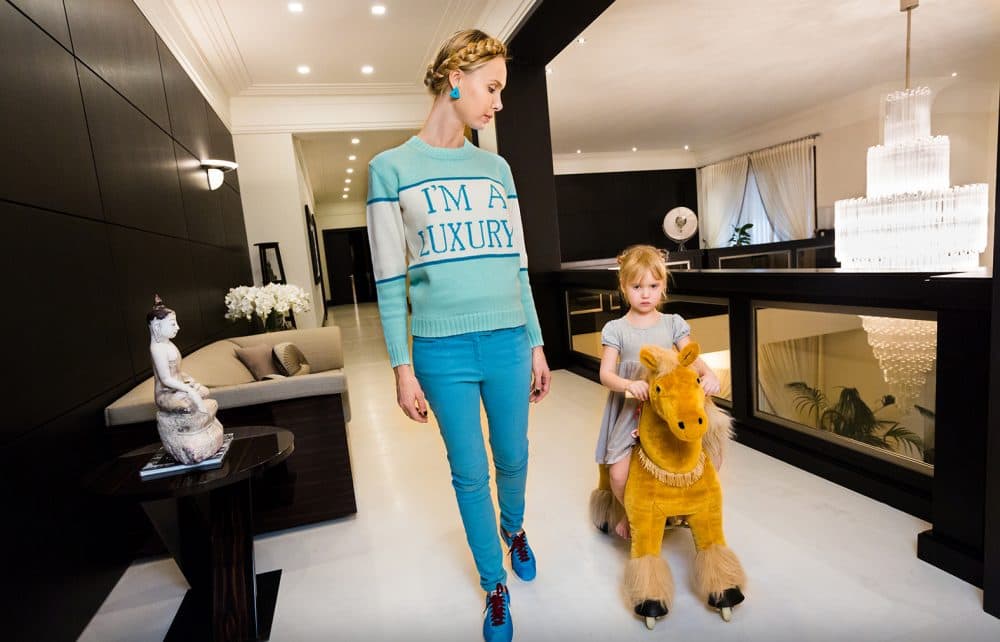Advertisement
Review
'Generation Wealth' Asks Why We Care So Much About Money

Ask Boston-born documentarian Lauren Greenfield if she’ll ever make a documentary about her life in full, and she’ll respond with a resounding "no," supplemented by infectious laughter.
If all you want from life is Greenfield documenting Greenfield, though, you can just watch her new film, “Generation Wealth,” a panoramic movie about global wealth culture (with an emphasis on American wealth culture) that moves from topic to topic, place to place, the United States to China, Germany to Iceland, pageant girls to porn stars, Kim Kardashian to Greenfield herself.
One of those last two things is not like the other, but that’s the point of the film: not that we should necessarily empathize with wealth culture’s most visible participants when wealth culture betrays them, but that we’re part of that culture whether we recognize it or not. We’re complicit.
As Greenfield explains, speaking last May at the Independent Film Festival Boston, “I don’t think we can kind of stand on the outside and judge, and I definitely felt that with the characters.” “Generation Wealth” doesn’t excuse or disguise the characters’ varying degrees of guilt, but it doesn’t go out of its way to underscore their guilt, either. “I really tried to not be judgmental of their choices,” she says, “but really to understand what it is about the culture that causes that behavior, causes people to act like they do.”
Here, “people” refers to the ultra wealthy and the rest of us in nearly equal measure. Greenfield’s argument about wealth culture starts at the top -- the 1 percent, the upper echelons of incalculable affluence and unconscionable rapacity — and trickles down to the rest of us. We see the ultra rich. We see the fallout of the reckless pursuit of prosperity, on the people who pursue it and on regular human beings who have to bear the burden of others’ avarice. (See: the 2008 financial crisis, just as a taster.) But we foremost see the benefits of that wealth, and we tend to forget about its dark side. Says Greenfield, “I think the thing about 'Generation Wealth' is ... it’s not about rich people. It’s about our aspiration for that, and that is the biggest tragedy.” History is rich with examples of spoiled moneyed types self-imploding and bringing down others with them, but we’re so enamored with opulence that we ignore the implosions.
“Generation Wealth” lets us get up close to a handful of those examples, too, like Florian Homm, a hedge fund manager guilty of scamming investors for millions (and millions, and millions) of dollars; he lives in Germany to duck extradition to the U.S., and thus the 225-year prison sentence he received for his crimes as well. But Homm’s is a cautionary tale rather than a bid for sympathy. Greenfield elaborates: “The 1 percent, they might have their own problems, but the biggest tragedy is we’re all kind of looking up to that and the influence that that lifestyle has on everybody else, and on our values and the aspirations that have become ... part and parcel of the American dream: the phenomenon of everybody trying to be other than they are, and striving for something that is unattainable, and the lack of satisfaction in that process, and the consequences of it for all of us.”

So don’t look at Homm as a casualty of wealth culture. Look at him as a criminal. Most of all, look at him as an object lesson in how the adverse effects of greed are abated. "He’s a perpetrator who gains knowledge that I think we can benefit from,” notes Greenfield. “He’s such an extreme character. He’s so much greedier than we are. But on the other hand, how many calls are we making a day? What are we looking for that mirrors his but not as extreme?” Ultimately, what “Generation Wealth” asks of its audience is to look in the mirror. Greenfield urges, as great a challenge as it sounds, to take the film’s parables as opportunities to confront our own drives and obsessions; she wants us to make unexpected connections with unexpected people. After all, in her words, “compulsion and addiction, in a way, feels the same for everybody. On the other hand, not to trivialize the life and death struggles or criminal struggles of the characters, but I do think that we need to see our own complicity, ourselves, our own compulsions.”
There’s a good reason for finding that connection beyond empathy (though don’t mistake “empathy” for “forgiveness”): The more we acknowledge it, the more we can ease our consumer addictions.
“What I saw in my work,” says Greenfield, “is that it's a contagious addiction.” Preventing the contagion from spreading is vital. If you catch it, there’s one way to kick it, and that’s to experience abject failure. “What you see in the film is that consumerism and all these other addictions that we’re on this cycle of that we can’t get off, that the only way to get rid of an addiction is to hit rock bottom,” Greenfield says. “Whether it’s the financial crash or the personal crashes ... in that crash, in that collapse, there’s a possibility for change.” She points to Iceland’s own financial collapse in 2008, which presented the country with a chance to restructure itself and bounce back from disaster, starting with jailing its bankers.
Recollections of these juxtaposed economic calamities raise important questions about the U.S. in regards to its relationship to the wealthy. What spurred Iceland to punish the guilty parties, and what kept our country from following suit? Greenfield feels the same frustration. “I thought the crash was that thing that we all learn from, and then it turned out that a lot of us in America and in the U.K., they kind of just fixed a sick system that came back to roar even stronger,” she says. We’re not unique in our fixation on status and wealth, of course, but here in the U.S. we perhaps are primed to let those fixations snare us. “I think in a way, we’re closest to the flame, so we’re the most extreme, but it’s like ‘Coming soon to a theater near you’ for other people, a lot of times generationally.” Eventually, that American lust for the high life is exported to other countries, be it through the media or through global corporate capitalism.

If “Generation Wealth” sounds like a nihilistic condemnation of capitalist culture, rest assured that Greenfield finds optimism in her exploration unchecked consumerism. “In the film,” she says, “the characters ... they have huge rises and falls, or maybe just falls, that they learn from, and kind of see the folly of their ways, or their aspirations, and get to a place where ... something else matters.”
What matters varies from person to person; perhaps family or friends, or the realization that you don’t actually need material goods to be happy. Whatever that thing is for you, the film lets us glean insight from its subjects’ breakdowns. There is, as Greenfield puts it, “hope in that idea of waking up.”
